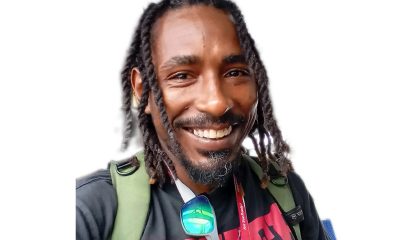Local
Wone’s widow takes the stand
Trial begins with wife’s testimony, chilling 911 tape
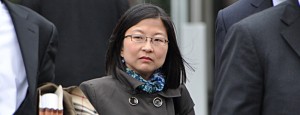
Katherine Wone, wife of slain attorney Robert Wone, testified this week about her husband’s relationship with the three gay men charged in connection with his murder. (Washington Blade photo by Michael Key)
The wife of slain attorney Robert Wone testified this week about her husband’s friendship with three gay men charged with obstructing a police investigation into his murder.
Katherine Wone, who became the government’s first witness Monday in a complex and long-awaited trial, said the couple gave money to a Virginia gay group that Joseph Price, one of the defendants, once chaired.
Price, 39, his domestic partner, Victor Zaborsky, 44, and the couple’s housemate, Dylan Ward, 39, are charged with obstruction of justice, conspiracy to obstruct justice and evidence tampering in connection with Wone’s August 2006 stabbing death in their Dupont Circle area townhouse. No one has been charged with the murder.
If convicted on all three counts, the defendants face a possible maximum sentence of 38 years in prison.
In testimony divided across two days, Katherine Wone said her husband, who became friends with Price during their days as students together at Virginia’s College of William & Mary, arranged to spend the night at the men’s house on Aug. 2, 2006.
She said he planned to work late at his job in D.C. as general counsel for Radio Free Asia and decided not to drive home that night to the couple’s house in Oakton, Va.
“Do you remember Robert saying he and Joe were good friends?” defense attorney Bernard Grimm asked Katherine Wone during cross-examination.
“Yes,” she said.
“Did you ever see a crossed word between Joe and Robert?” Grimm asked.
“No,” she replied.
In response to questions from Grimm, Katherine Wone said her husband was aware that Price was involved with Equality Virginia, a statewide gay civil rights group, and that he supported the cause of equal rights for “all people.”
She told of how she and Robert Wone accepted an invitation from Price to attend an Equality Virginia fundraising dinner in Richmond one year before the murder. And she confirmed that a photo of the Wones and Price that Grimm showed her on the witness stand was taken at the dinner.
The three defendants have said through their lawyers that an intruder killed Robert Wone after entering their house from a rear door while the men slept in their bedrooms. Each of their attorneys stressed during opening arguments that their clients’ friendship with Wone demonstrated they had no motive to harm him and that the government had failed to find a motive for the murder.
But Assistant U.S. Attorney Glenn Kirschner, the lead prosecutor, noted in his opening argument that the men tampered with the crime scene and repeatedly misled police and homicide detectives investigating the murder. He said the defendants know — but refuse to disclose — the identity of the person or people who fatally stabbed Wone in the chest.
Among other things, Kirschner noted that paramedics and crime scene investigators found almost no blood on Wone’s body or the bed where he was found with three large stab wounds. There were no signs of a struggle, no defensive wounds on his arms, no signs of forced entry into the house, and nothing was disturbed or taken from the house, Kirschner said.
All of this, he said, was evidence of crime scene tampering and completely dispelled the defendants’ claim that an intruder killed Wone.
Defense attorneys representing the three gay men countered that the evidence doesn’t support any of the government’s allegations, including an assertion that more blood should have been found on the scene.
They planned to call an expert witness, a cardiac surgeon, who is expected to testify that the single stab wound piercing Wone’s heart would have killed him within five seconds, shutting down the heart’s ability to pump blood. A stopped heart, rather than a sinister plot postulated by the government, was the reason little or no blood was seen, defense attorneys said.
From the moment homicide detectives arrived at the house to investigate the murder, they became “marred and infatuated in a theory based on ignorance,” prompting them to suspect the men were involved in the murder, said Grimm, who is Price’s attorney.
“Why is a straight man coming to the house of a gay man,” Grimm quoted a detective as saying while interviewing the defendants.
Grimm and David Schertler, Ward’s attorney, said in their opening arguments that the three defendants’ sexual orientation and their three-way relationship played a role in shaping police and prosecutor assumptions that they, rather than an intruder, were involved in the murder.
Kirschner challenged that assertion, however, saying investigators have linked the men to a conspiracy to obstruct the investigation based on a vast array of crime scene findings.
“This case is not about sexual orientation,” he told D.C. Superior Court Judge Lynn Leibovitz, who is poised to decide the men’s fate after the defendants opted to forego a jury trial.
“This case is not about the personal relationship of these three. There is nothing negative that can be inferred due to the sexual orientation or lifestyle choices of these men,” he said.
But he noted that Price, Zaborsky and Ward “had powerful bonds among them,” which amounted to a “tight knit family” that is protecting its members from the harm that would come to them “if the truth came out.”
911 tape stirs courtroom
Katherine Wone’s calm testimony was offset Tuesday afternoon when prosecutors played a dramatic audio tape of Zaborsky’s 911 call reporting that Wone had been stabbed in his house.
On the recording, which lasts about 12 minutes, a near hysterical Zaborsky is heard making a desperate plea for help. He tells the 911 operator that a male friend visiting the house “is not conscious” after being stabbed.
When the operator asked him who stabbed the person, Zaborsky replied, “I don’t know who stabbed him. We don’t know how they got in. The person has one of our knives. … I’m afraid to go downstairs.”
The operator then urged Zaborsky to use a towel to stop the bleeding by pressing it firmly on the stab wound. He replied that his housemate, meaning Price, was already doing that in the guest bedroom where the stabbing victim was staying.
In a development that prosecutors have called highly significant, Zaborsky is heard on the tape asking the operator, “What time is it?” The operator, sounding surprised, repeated the question before responding, “11:54.”
One day earlier, in his opening argument, prosecutor Kirschner said that Zaborsky’s question about the time was among the indicators that he participated in a conspiracy to conceal from investigators what really happened during Wone’s brief stay at the men’s house.
Investigators believe Wone arrived at the house shortly after 10:30 p.m. Kirschner followed up on the chronology of the incident when he next called as witnesses William and Claudia Thomas, a married couple who live in the townhouse adjoining the defendants’ house at 1509 Swann St., N.W.
William Thomas testified that he heard a scream coming from the defendants’ house through a wall shared by the two houses on the night of the murder. He said he did not check the time when he heard the scream, but said he remembered hearing his wife watching the 11 p.m. news on Channel 7. His wife backed up that account during her own testimony.
Based on that account, police and prosecutors have said between 12 and 49 minutes elapsed from the time of the scream and the time Zaborsky called 911 at 11:49 p.m.
Investigators have said the scream could have marked the time Wone was stabbed. A delay of even 12 minutes in making the 911 call could have been used to clean the crime scene and hide or discard other evidence linked to the murder.
The Thomas’ testimony was followed by testimony from Jeff Baker, one of the first of the paramedics to arrive at the house in response to the 911 call.
Baker said the first of several highly unusual murder scene observations he made came during his encounter with Ward, who was standing at the top of the second floor staircase when Baker approach the room where Wone’s body was found. He noted that when he asked Ward what happened, Ward ignored him and retreated into his bedroom.
Upon entering the room where Wone was lying lifeless on a pull-out sofa bed, Baker said, he was startled at what he saw. Wone was lying “flat on his back” with three stab wounds to his chest with almost no blood on his body or on the bed, he said.
This was highly unusual for a stabbing, Baker said, based on his experience in responding to hundreds of stabbings during his 14 years as a paramedic.
He said Price was sitting on the bed next to Wone’s lifeless body. There was no towel on Wone’s wounds and Price’s hands had no signs of blood, which would be expected if he had been holding the towel on Wone’s chest.
Baker said he later observed a light streak of blood on Wone’s abdomen that appeared as if it had been “wiped.”
Kirschner said in his opening argument that investigators found the towel in the room, but it had only a small amount of blood on it. He noted that Price told police he found one of the knives from the men’s kitchen in the room where Wone was stabbed.
Authorities later reported that cotton fibers found on the knife indicated that blood had been taken from Wone’s wounds and wiped onto the knife with a towel to make it look like the murder weapon. Although fibers found on the knife matched that of a towel, no fibers were found that matched the shirt Wone wore and which had been pierced by the knife used to kill him, Kirschner said in his opening argument.
Police evidence experts and findings from an autopsy on Wone also showed the blood on the knife covered the entire blade, even though the depth of the wounds on Wone’s chest indicated that blood would not have covered the full length of the blade, Kirschner said.
Kirschner has said this was further evidence that the men tampered with the crime scene to mislead police. He noted that a cutlery set found in Ward’s bedroom had one knife missing. When investigators obtained a duplicate knife from the manufacturer, they found it matched the size and depth of Wone’s wounds better than the bloody knife found at the scene, further suggesting that someone other than an intruder and someone known to the defendants was responsible for the murder.
Defense attorneys disputed these assertions in their opening arguments, saying their own expert witnesses would testify that the cotton fibers on the knife could not be accurately linked to either the towel or Wone’s shirt. Instead, they said the fibers are found in the ambient air and on all objects and were meaningless as evidence in a stabbing.
What really happened, Schertler said in his opening argument, is that the defendants are telling the truth in saying they were not involved in the murder and that an intruder killed Robert Wone.
D.C. attorney Dale Edwin Sanders, who practices criminal law and is not associated with the case, said the part of the government’s case that appears the strongest is its assertion that no evidence exists to show an intruder entered the house to kill Wone. He noted that in cases based on circumstantial evidence, sometimes “missing” evidence becomes the key to the case.
“It’s largely a circumstantial case,” he said. “There’s no smoking gun, but the government has presented a neatly interwoven mosaic of 100 pieces of evidence that all fit together.”
Other observers at the trial said the defense was ready to discredit or downplay the government’s evidence with the aim of establishing enough doubt that Leibovitz would have to find the men not guilty.
Attorneys on both sides have predicted the trial would last about five weeks.
District of Columbia
Little Gay Pub to host April 25 celebration of life for Patrick Shaw
School teacher, D.C. resident praised for ‘warmth, humor, kindness’
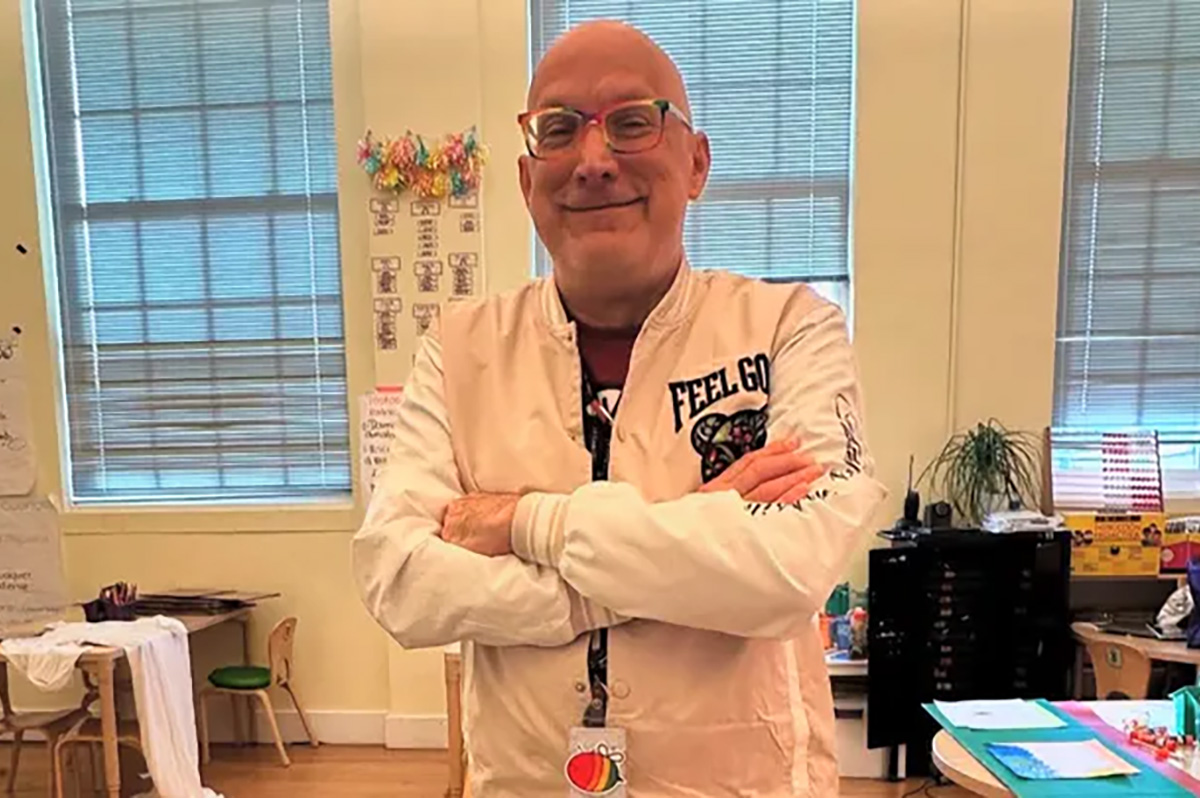
Co-workers and friends will hold a celebration of life for highly acclaimed schoolteacher and D.C. resident Patrick Shaw beginning at 5:30 p.m. Friday, April 25 at The Little Gay Pub 1100 P St., N.W.
Little Gay Pub co-owner and Shaw’s friend, Dusty Martinez, said Shaw passed away unexpectedly on April 19 from a heart related ailment at the age of 60.
“Patrick touched so many lives with his warmth, humor, kindness, and unmistakable spark,” Martinez said. “He was a truly special soul – funny, vibrant, sassy, and full of life and we are heartbroken by his loss.”
In an Instagram posting, Shaw’s colleagues said Shaw was a second-grade special education teacher at the J.F. Cook campus of D.C.’s Mundo Verde Bilingual Public Charter School.
“Patrick brought warmth, joy, and deep commitment to Mundo Verde,” his colleagues said in their posting. “His daily Broadway sing-alongs, vibrant outfits, and genuine love for his students filled our community with energy and laughter.”
The posted message adds, “Patrick was more than a teacher; he was a light in our school, inspiring us all to show up with heart, humor, and kindness every day. His spirit will be deeply missed.”
The Washington Blade is preparing a full obituary on Patrick Shaw to be published soon.
District of Columbia
D.C. police seek help in identifying suspect in anti-gay threats case
Victim threatened with assault, called ‘faggot’ as he left Capitals game
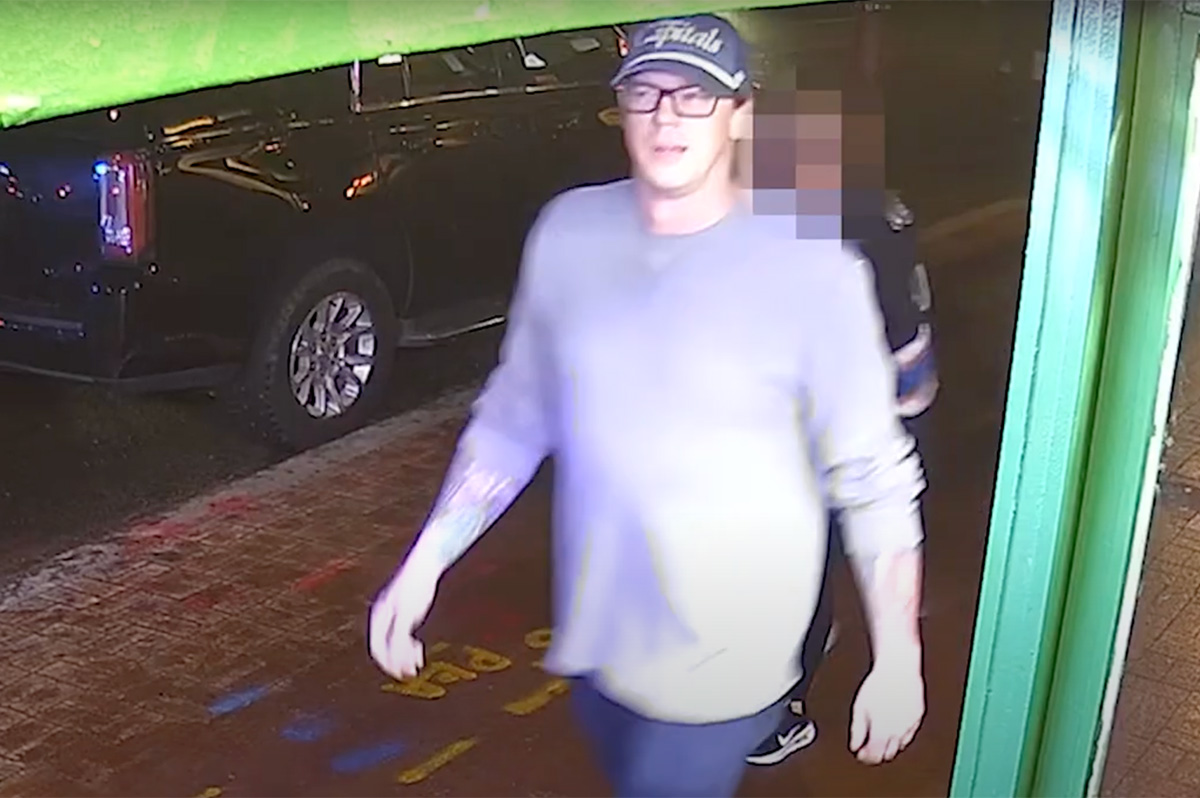
D.C. police are seeking help from the public in identifying a male suspect whose image was captured by a video surveillance camera after he allegedly shouted anti-gay slurs and threatened to assault a man at 6th and H Streets, N.W. on March 20 at about 9:54 p.m.
A police report says the victim told police the incident took place shortly after he exited the nearby Capital One Arena where he had attended a Washington Capitals hockey game.
The police report says the incident began when the victim saw the suspect yell a racist slur at a person behind the victim and started to berate a valet operator.
“Suspect 1 then turned his attention to Victim 1 and called him a ‘faggot’ among other homophobic slurs,” the report says. It says the victim then used his phone to record the suspect, prompting the suspect to walk away before returning and “snatching” the phone from the victim’s hand.
“Suspect 1 walked several feet as Victim 1 followed, requesting his phone back,” the report continues. “Suspect 1 stopped and turned to Victim 1 and while yelling other obscenities exclaimed ‘if you keep recording, I’m going to kick your ass.’” The report concludes by saying the victim was able to recover his phone.
It lists the incident as a “Threats To Do Bodily Harm” offense that is a suspected hate crime.
“Anyone who can identify this suspect or has knowledge of this incident should take no action but call police at 202-727-9099, or text your tip to the Department’s TEXT TIP LINE at 50411,” according to a separate police statement released April 23.
The statement says police currently offer an award of up to $1,000 to anyone who can provide information that leads to an arrest and indictment of the person or persons responsible for a crime committed in D.C.
D.C. police spokesperson Tom Lynch said the case has been under investigation since the incident occurred on March 20. He said the video image of the suspect, most likely obtained from a security camera from a nearby business, was released to the public as soon as it was obtained and processed through the investigation.
District of Columbia
Wanda Alston Foundation names new executive director
Longtime LGBTQ rights advocate Cesar Toledo to succeed June Crenshaw
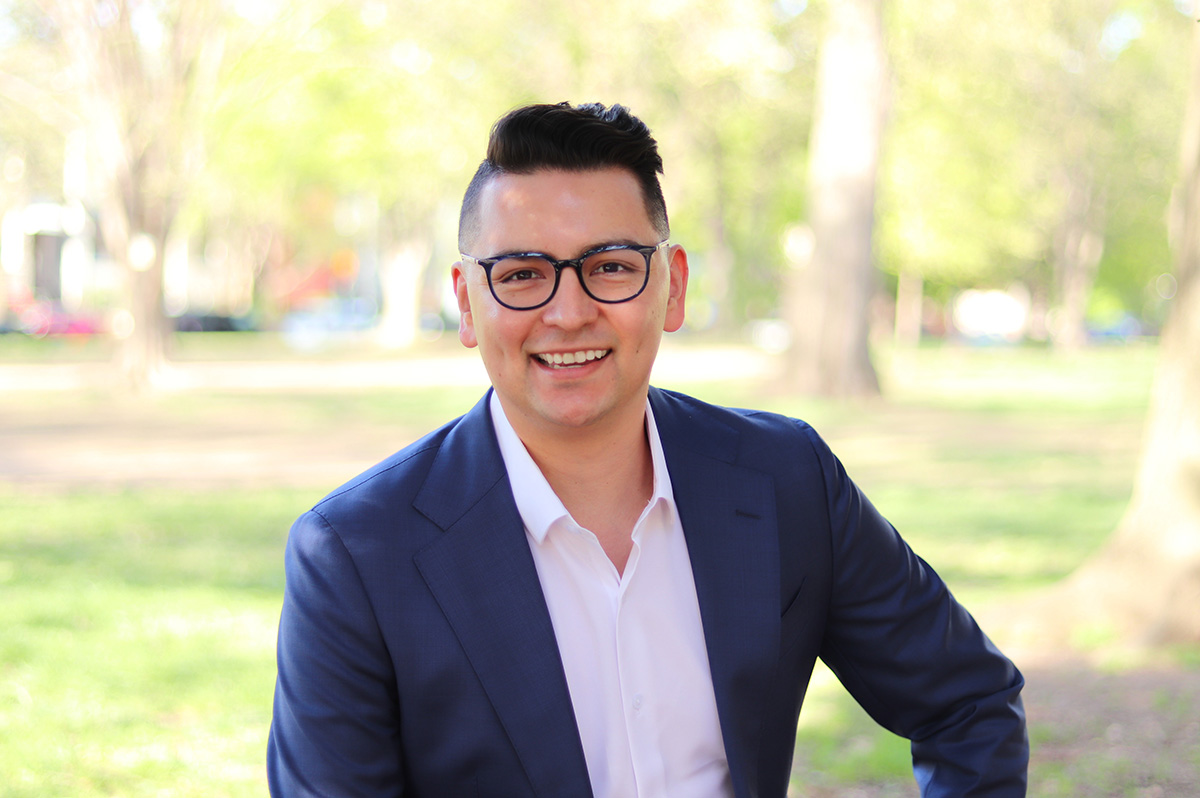
The Wanda Alston Foundation, the D.C.-based organization that has provided housing and support services for homeless LGBTQ youth since its founding in 2008, announced it has appointed longtime LGBTQ rights advocate Cesar Toledo as its new executive director.
In an April 22 statement, the organization said that as part of a planned leadership transition launched in November 2024, Toledo will succeed June Crenshaw, who Alston Foundation officials and LGBTQ community activists say has led the organization with distinction in her role as executive director for the past nine years.
In a statement released last November, the foundation announced Crenshaw was stepping down from her role as executive director after deciding to “to step into her next chapter.”
“June’s leadership has been truly transformative,” said Alston Foundation Board Chair Darrin Glymph in the group’s April 22 statement. “We are immensely grateful for her dedication and equally excited for the energy and experience that Cesar brings to lead us into this next chapter,” Glymph said.
“A seasoned LGBTQ+ advocate, Cesar brings over a decade of experience leading national campaigns, shaping public policy, and building inclusive communities,” the statement released by the group says. “Most recently, he served as the National LGBTQ+ Engagement Director for the Harris for President Campaign and has built a career focused on advancing equality and equitable education,” it says.
Biographical information about Toledo shows that immediately prior to working for the Harris For President Campaign, he served since April 2023 as deputy director for Democrats for Education Reform DC (DFER DC), a political group that helps to elect candidates for public office committed to quality education for all students, including minorities, people of color and LGBTQ youth.
Before joining DFER DC, Toledo served as political director for the LGBTQ+ Victory Fund, where he assisted in electing out LGBTQ candidates to all levels of public office across the U.S.
“I’m really excited about joining the Wanda Alston Foundation,” Toledo told the Washington Blade. “After a decade of working at the intersection of politics and policy and advancing political candidates and equitable education here in D.C., I wanted to shift my career to direct services to the most vulnerable folks in the LGBTQ+ family and our homeless youth,” he said.
Among other things, he said he would push for increasing the Alston Foundation’s visibility and mainlining its services for LGBTQ youth at a time when the national political climate has become less supportive.
A statement on its website says the Alston Foundation was founded in 2008 “in memory of Wanda Alston, a fierce LGBTQ+ activist, national advocate, and government official who was admired by District residents.”
The statement adds, “The foundation opened the first housing program in the nation’s capital in 2008 providing pre-independent transitional living and life-saving support services to LGBTQ+ youth.”
In a separate statement, the Alston Foundation announced it would hold a “thank you” celebration of appreciation for June Crenshaw from 6-8 p.m. on May 20 at Crush Dance Bar located at 2007 14th Street, N.W. in D.C.
“Let’s come together to celebrate her dedication and commitment for everything she has done for the LGBTQIA homeless youth population,” the statement says.
-

 Federal Government2 days ago
Federal Government2 days agoHHS to retire 988 crisis lifeline for LGBTQ youth
-

 Opinions2 days ago
Opinions2 days agoDavid Hogg’s arrogant, self-indulgent stunt
-

 District of Columbia2 days ago
District of Columbia2 days agoD.C. police seek help in identifying suspect in anti-gay threats case
-

 Opinions2 days ago
Opinions2 days agoOn Pope Francis, Opus Dei and ongoing religious intolerance



